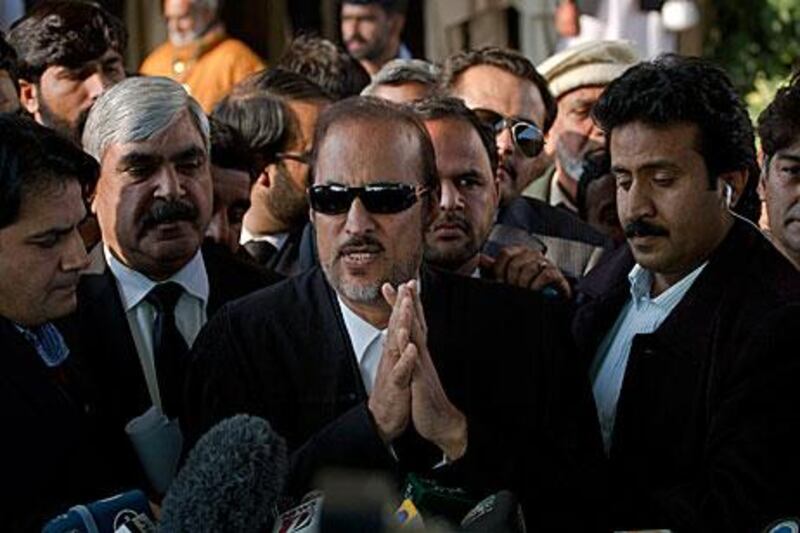ISLAMABAD // Pakistan's Supreme Court yesterday warned it could dismiss the prime minister if he failed to reopen corruption charges against President Asif Ali Zardari, the latest salvo in a long-running row between an assertive judiciary and a weak government.
PAKISTAN
Latest news and features for Pakistan.
Bomb kills 35 in deadliest attack in months in Pakistan. Read article
Musharraf will need strong allies for his tough homecoming. Read article
Former Pakistan president Musharraf to return from exile. Read article
[ MORE ON PAKISTAN ]
The court stopped short of announcing any punishment but hinted action could be taken against Mr Zardari or the prime minister, Yusuf Raza Gilani, and that they could be dismissed from office for defying the court's 2009 ruling that overturned a controversial amnesty granted to Mr Zardari and thousands of political activists involved in corruption cases.
"The prime minister, prime facie [on the face of it] is no more honest as required under the constitution and he could be disqualified [from parliament] ," Asif Saeed Khosa, the head of the five-judge panel, said while reading out the judgement in his court.
Mr Gilani would be fored out as prime minister if he is disqualified from the parliament.
Under Pakistani constitution, in such a case the parliament would elect a new prime minister through majority vote.
The government has refused to reopen corruption cases against Mr Zardari, saying he enjoyed presidential immunity under the constitution. Former president Pervez Musharraf passed the amnesty to allow the 2007 return of Mr Zardari and his wife and former premier, Benazir Bhutto, who were implicated in graft allegations.
Now Mr Musharraf, who has been living in self-exile in Dubai and London, plans to return to Pakistan to lead a political movement, despite the risk of being arrested for failing to cooperate with an inquiry into Bhutto's assassination in December 2007.
The government was defiant after the latest judgment.
"The people have to decide who is qualified and who is not, who is popular and who is not. No one can give a verdict better than the people," a senior government lawyer and Mr Zardari's legal aide, Babar Awan, told reporters outside the Supreme Court.
Many analysts believe the court may not carry out its threat against the government, But its decision has deepened the recent political turmoil triggered by a scandal over inquiries into whether someone in the government wrote a memo to the Obama administration seeking help against a possible military coup.
The Supreme Court last week set up a judicial panel to investigate the scandal, rejecting a government plea claiming that the court did not have the powers for such an inquiry.
The unsigned memo sent to the then chairman of the US Joint Chiefs of Staff, Admiral Mike Mullen, by a businessman who said he was acting for the ambassador to Washington, Husain Haqqani, sought help after the US special forces raid that killed Osama bin Laden in a Pakistani military town last year.
Mr Zardari and Mr Haqqani deny any involvement, but Mr Haqqani was forced to resign. The suggestion the civilian government - already attacked over its close ties with the US - was striking clandestine deals with Washington has the potential to further destabilise Mr Zardari and his government.
Mr Zardari is due in Dubai today for further medical treatment after a similar visit last month,
In an interview with Pakistan's Geo television aired on Saturday, Mr Zardari said he had no intention of stepping down.
The army has ruled Pakistan for half its existence and is the most powerful political force in the country. It wants a full Supreme Court investigation into the memo scandal and a parliamentary inquiry.
On Monday, the government said the army chief, General Ashfaq Kayani, and the head of the main Inter-Services Intelligence spy agency, Lieutenant General Shuja Pasha, submitted their statements to the Supreme Court inquiry without the government's approval, which was "unconstitutional and illegal".
Mr Gilani last month said conspiracies were being hatched to topple his government, a clear reference to the army. General Kayuni denied the military was plotting a coup and pledged support for the democratic process.
Political turmoil in Pakistan is a major worry for the US and neighbouring Afghanistan as they prepare for the withdrawal of foreign troops in 2014 and press Pakistan to focus more attention on fighting Islamist militancy.





